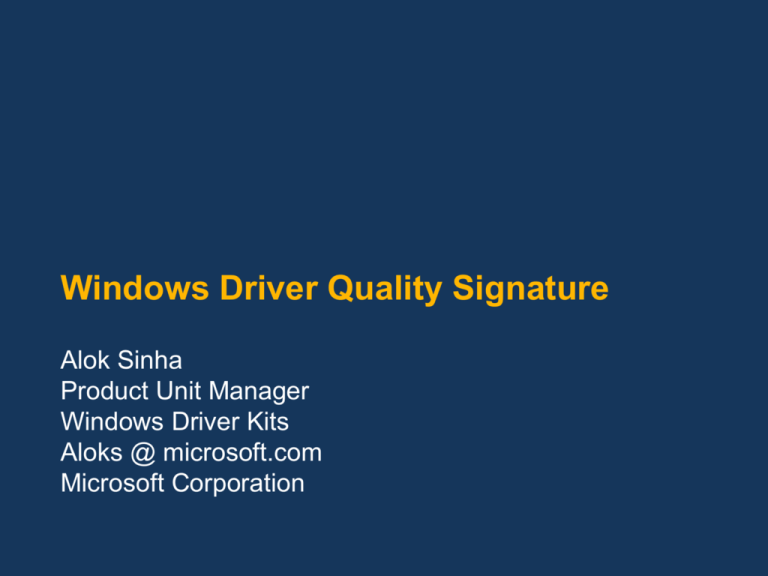
Windows Driver Quality Signature
Alok Sinha
Product Unit Manager
Windows Driver Kits
Aloks @ microsoft.com
Microsoft Corporation
Session Outline
Driver Quality Challenge
Solutions from Microsoft
Tools and services
Driver Quality Signature
Strategic direction of Driver
Quality Signature
We need your feedback
Driver Quality Affects Product Success In All Scenarios
Trends
x64/Dual core
Wireless
Digital Media
Personal Storage
Storage area network (SAN)
Blades
Mobility
More…
Top 10 Crash Categories
As a percent of all OCA crashes reported in a single month
March ‘04
#
Category
March ‘05
March ‘04
#
March ‘05
Category
1
Display
17.9%
1
Display
▬
17.9%
2
Pool/Memory Corruption
13.6%
2
Pool/Memory Corruption
▲
15.9%
3
OS Core
13.5%
3
OS Core
▲
14.2%
4
Networking
12.6%
4
Networking
▼
10.8%
5
Multimedia
9.51%
5
Multimedia
▼
7.68%
6
Application Drivers
6.57%
6
Application Drivers
▲
7.51%
7
Anti-virus
5.54%
7
Hardware Failures
▲
7.00%
8
CD-Burning
5.39%
8
Anti-virus
▼
5.42%
9
Hardware Failures
4.99%
9
Storage
▲
4.94%
Storage
4.60%
10
CD-Burning
▼
4.28%
10
Microsoft’s Investments In Driver Quality
Device Software Lifecycle
Build it right
Windows Driver Foundation
Kernel and User Driver Frameworks
Static Driver Analysis tools
Windows Driver Kit
Driver Test Manager
Driver test tools
DIFx tools
Enabling better design
Enabling easier development
Enabling simpler testing
Driver Signing
Problem Definition
User expectations for reliability, stability, and overall quality of
experience have increased
But, reports of crashes continue to come via Windows Error Reporting
(WER)
Lack of Microsoft sponsored program for new and emerging device
categories
Some partners do not have the option of using Microsoft provided tools
and services
Unsigned drivers lead to install time warning User Interface (UI)
Leads to confusion for user (can they trust the driver?)
It is difficult to perform crash analysis on unsigned drivers
Driver Signing
Solutions
Microsoft is making significant investments related to driver signing
Creating Driver Quality Signature (DQS) as a quality bar for Windows
codenamed Longhorn drivers
DQS is core component for every level of logo program
Emerging category of device (drivers) can be signed with DQS
Other related investments
The Next Generation Logo Program An Introduction (TWDE05005)
How to Improve Driver Quality with Winqual and Windows Hardware Quality
Labs (WHQL) (TWDE05006)
Windows Driver Foundation: An Introduction (TWDE05002)
Partner Commitment
Get your drivers signed through the Logo Program or DQS
Longhorn Driver
Signing Summary
Driver quality is a focus of Longhorn signing policy
Partner’s increased level of commitment leads to higher user
confidence
User confidence
Signature
Publisher
How you get it
Impact
(cumulative from bottom)
Example Usage
Windows Partner
Logo Program
Microsoft
Required for participants of
Longhorn Logo Program
Devices which fit Logo
category
Microsoft Driver
Quality Signature
Microsoft
Publisher is trusted by
default
Devices which do not fit
Logo categories
Authenticode
Obtain class 3
certificate from
CA and selfsign
Non-admins can install
only from trusted
publishers
Only admin can make a
publisher trusted
In-house and Enterprise
development
Only admin can install
Domain admin wants full
control of devices installed
Unsigned
Recommendation For Signature In
Longhorn
Program
Longhorn Logo Program
Driver Quality Signature
Category
Drivers in Logo Program categories
New devices for which there is no Logo
Program category
In-house and enterprise development
Authenticode
Unsigned
Drivers
Logo’d
Drivers
Authenticode
Drivers
Increase %
of signed
qualitytested
drivers
DQS
Drivers
Unsigned
Drivers
Signatures in Windows XP
Signatures in Longhorn
Logo’d
Drivers
Driver Quality Signature
DQS Goals
Goal: Improve Windows system stability
and reliability
Raise driver quality (as measured through Online Crash
Analysis)
Drive continuous improvement in Windows
driver quality
Plan to ship Driver Quality Tools with Windows Driver Kit
Plan to periodically update Driver Quality Tools after Longhorn ship
Goal: Maximize customer value of signature with
minimal impact to partners
Invest in seeking feedback from partners on
cost-effectiveness and efficacy of tools
Continuous Improvement
Crash Analysis to Finding Solutions
Improvement in Quality tests and tools with partner feedback
E.g., if a test can catch specific Online Crash Analysis (OCA) issue, we will
update it
Microsoft
Microsoft Research
Feedback from Partner
Windows Error Reporting
Gather Data
Analyze
Validate
Partner
Use WDK to validate
Feedback to Microsoft
Microsoft
Update to Tests and Tools
Provide OCA data
Act
Partner
Download OCA Data
Analyze Results and Fix Driver
Taxonomy Of Driver Quality Tools
Tools Migrate, if Proven to Improve Quality and Can Give Pass/Fail, to Tests
Quality Tests
Proven to improve Quality
Low cost to independent hardware
vendor (IHV)
Tests run and passed
Quality Tools
Potential to improve Quality
Run all Tools and respond to output
Driver Quality Tests and Tools are
Independent of driver class
Focused on improving driver stability and reliability
How To Get Signature
DQS For Logo Category
Of Drivers
Functionality Requirements
Quality Requirements
“Gold”
Driver Quality Tests and Tools are
core component of Logo Tests and
shipped in WDK
For Logo category of devices,
continue to get Logo signature
using WDK and WinQual
Details: TWDE05005:
“The Next Generation Logo
Program: An Introduction”
“Silver”
“Quality”
Requirements build on each other
Longhorn Logo
Program includes
DQS For Emerging Devices
For User mode drivers
Build with User Mode Driver Framework (UMDF), if
appropriate
Run Application Verifier
For Kernel mode drivers
Run and pass Driver Quality Tests
Run Driver Quality Tools and resolve
issues flagged
Use Windows Driver Kit (WDK) to upload results
to WinQual to get signature
Tools Available To Improve Driver
Quality
Static Tools For Drivers
PREfast for Drivers (PFD)
Lightweight/fast
Use early in development
Limited to function scope
C and C++
Static Driver Verifier (SDV)
Microsoft Results
Code Base
Drivers
Verified
Defects
Found
Code Base 1
100
231
Code Base 2
26
33
Extremely deep analysis
More useful in the later stages of development
Requires complete driver
Works over the whole driver
Limited to some kinds of drivers, and to C
PFD available in Windows Server 2003 Device
Driver Kit
Quality Tools In Server Driver Development Kit (DDK) And HCT 12.1.01
Call Usage Verifier (CUV)
Detects Initialization Errors (spin locks, lists, etc.)
Detects I/O request packet (IRP) Stack Errors
Consistency Errors in Spin Lock and Interlocked lists
Device Path Exerciser (DPE)
DPE improves drivers quality by testing correctness of I/O control
(IOCTL) handling
DPE helps with memory leak monitoring
Driver Verifier (DV)
Monitors 14 distinct checks for all drivers including Display drivers
E.g., input/output (I/O) verification, Memory Pool Monitoring, Low Resource
Allocation
Bug Check on improper usage
Windows Driver Foundation
Case Study: OSRUSBFX2 Sample
Metric
A quicker, cheaper and easier way
of developing and deploying your
driver to market
Reduced chances that
device driver is a cause of system
crash
Reduced support costs
Better diagnosability
and debugging and
logging support
Improved system stability
and reliability
Higher quality drivers
Windows
Driver
Model
Windows
Driver
Foundation
Comments
Line Count
16350
2300
Explicit
registration of
granular event
callbacks add to
the line count
LOC devoted
to PnP/PM
6700
742
742 includes
code to initialize
the USB
0
This is the most
important stat.
This explains
the complexity
0
There are fewer
paths in the
driver and
hence less
complexity
Locks
(6 Events,
3 SpinLocks)
State variables
devoted to
PnP/PM
9
21
The Windows Driver Model (WDM) version of OSRUSBFx2 sample available on osronline.com and the Windows
Driver Foundation (WDF) version provided in the Driver Development Kit (DDK) are functionally equivalent
Details: “TWDE05002 – Windows Driver Foundation An Introduction”
Windows Driver Kit (WDK)
One Single Kit
More than a simple combination of DDK, installable file system (IFS) Kit and
hardware compatibility test (HCT)
Content, tests, tools, development environment
Driver Test Manager replaces HCT
Key WDK Objectives
Build, test, debug drivers on Windows 2000 forward to Longhorn
Support DQS and Logo programs
Including Longhorn Logo program testing and DQS
For Longhorn and previous Windows versions
HCT replaced by WDK at Longhorn RTM
Delivery Plans for WDK
Plan to make beta available with Longhorn Beta1
Plan to ship with Longhorn Release Candidate (RC)
Windows Driver Kit
Integrated build environment for device software development
Operating System and
Tools Documentation
Development
Tools
(PREfast)
Logo Tests
Quality Tests
Kernel
Debugger
Maintain
Samples
Template
Drivers
Qualify
WinQual
Integration
Test
Driver Test
Manager
Develop
Build
Environment
Design
Windows Driver
Foundation
Key Usage Scenarios
1
Build Drivers
( Windows 2000
LH)
2
Debug Drivers
3
Driver Testing
4
Logo Testing
Windows Driver Kit And WinQual
Integration
Logs, results, machine
configuration data
WDK
Submit to
WinQual
Drivers
Driver Store
Longhorn DQ Tests And Tools Timeline
Timeline
Plan to make available starting with Longhorn Beta 2
Plan to ship final bits at Longhorn Release
Candidate (RC)
DQ tests and tools ship with WDK
Driver Test Manager (DTM) is only test harness
Continuous improvement (after Longhorn ships)
Improvement in tests and tools with partner feedback
Periodic updates of tests and tools
Summary
Users are expecting reliability and stability
Let us work together to improve quality of drivers for our mutual end-user
customers
Microsoft Investments
Windows Driver Kit (WDK)
Windows Driver Foundation (WDF)
Driver Quality Tests and Tools
DQ Signature is core component for Logo
Recommendations for Partner
Begin to use quality tools now
Sign up for WDK Beta to get Driver Quality Tests and Tools
Prepare to get your driver signed for Longhorn
Call To Action
Contact us at dqsfeed @ microsoft.com
Begin using Driver Quality Tests and Tools
WDF – WDF Beta
http://www.microsoft.com/whdc/driver/wdf/beta.mspx
CUV, PFD – Windows Server 2003 Driver Development Kit
DPE and digital video – hardware compatibility test 12.1.01
Provide feedback once Windows Driver Kit Beta is available
Visit the Beta Program Signup desk in the Microsoft booth
in the Exhibit Hall
Attend the following sessions
TWDE05006: How to Improve Driver Quality with Winqual and WHQL
TWDE05002: Windows Driver Foundation: An Introduction
TWDE05004: The WDK for Engineering Managers and Product Planners: An
Introduction
Community Resources
Windows Hardware and Driver Central (WHDC)
www.microsoft.com/whdc/default.mspx
Technical Communities
www.microsoft.com/communities/products/default.mspx
Non-Microsoft Community Sites
www.microsoft.com/communities/related/default.mspx
Microsoft Public Newsgroups
www.microsoft.com/communities/newsgroups
Technical Chats and Webcasts
www.microsoft.com/communities/chats/default.mspx
www.microsoft.com/webcasts
Microsoft Blogs
www.microsoft.com/communities/blogs
Additional Resources
Community Sites
http://www.microsoft.com/communities/default.mspx
List of Newsgroups
http://communities2.microsoft.com/communities/newsgroups/enus/default.aspx
Attend a free chat or webcast
http://www.microsoft.com/communities/chats/default.mspx
http://www.microsoft.com/seminar/events/webcasts/default.mspx
Locate a local user group(s)
http://www.microsoft.com/communities/usergroups/default.mspx
Non-Microsoft Community Sites
http://www.microsoft.com/communities/related/default.mspx
Additional Resources
E-Mail: dqsfeed @ microsoft.com
Web Resources
WDK: http://www.microsoft.com/whdc/driver/wdk/default.mspx
Testing: http://www.microsoft.com/whdc/whql/default.mspx
DDK: http://www.microsoft.com/whdc/DevTools/default.mspx
Overall: http://www.Microsoft.com/WHDC/
Related Sessions
TWWI05010: Business Value of the Windows Device Software Life
Cycle
TWDE05005: The Next Generation Logo Program
An Introduction
TWDE05006: How to Improve Driver Quality with
Winqual and WHQL
TWDE05004: The WDK for Engineering Managers and Product
Planners: An Introduction
© 2005 Microsoft Corporation. All rights reserved.
This presentation is for informational purposes only. Microsoft makes no warranties, express or implied, in this summary.

